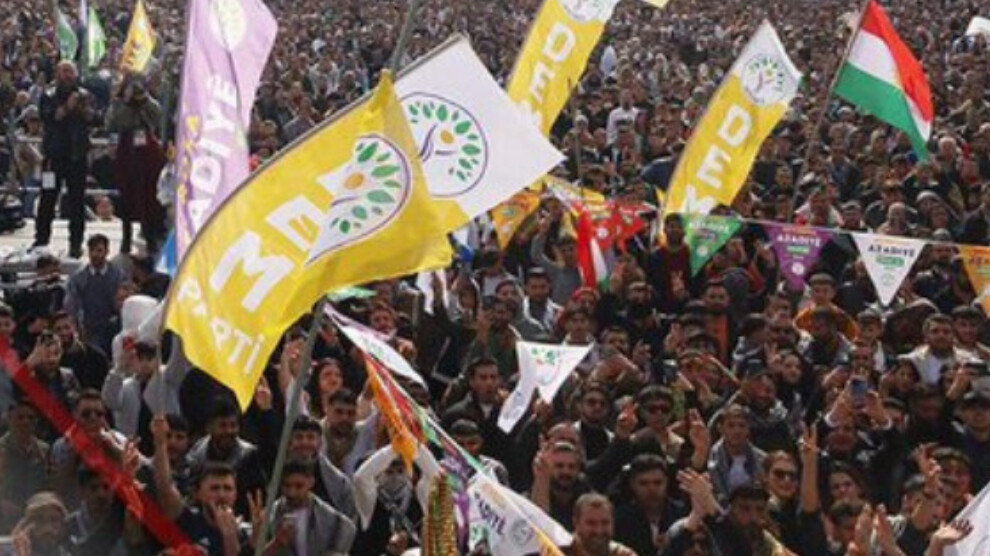'Solution process' at a critical stage
Abdullah Öcalan and the Kurdish people are ready, but questions remain about the government’s readiness.
Abdullah Öcalan and the Kurdish people are ready, but questions remain about the government’s readiness.

Abdullah Öcalan’s February 27 Call for Peace and a Democratic Society has not been followed by any visible steps from the Justice and Development Party (AKP) government. The government has instead pressured the Kurdistan Workers’ Party (PKK) to hold a congress and declare an end to the armed struggle. It has also continued Mr. Öcalan’s isolation, contradicting the spirit of peace and resolution.
The government is able to engage with both its own representatives and the opposing side’s representatives. It consults experts on topics of its choosing and prepares its reports accordingly. However, it continues to treat the other side’s representative as though they are a hostage. This approach suggests a lack of genuine intent for peace and resolution. If the war is to end and hostilities are to cease, then what purpose does this isolation and hostage-like treatment serve? Kurds and Turks have lived together for a thousand years. Those calling for reinforcing this brotherhood and holding a historic meeting rooted in their shared past should not resort to political maneuvers and tactical games. Why this need arises remains difficult to understand. In this context, the government’s stance does not inspire trust among the Kurdish people.
Mr. Öcalan made it clear that the armed struggle would come to an end and that the PKK would be dissolved. This marks a significant step, demonstrating a willingness to take on considerable responsibility. There is no third party involved, nor any guarantees. Öcalan is moving forward, while the state authorities remain hesitant and slow to act, still resorting to psychological warfare tactics in some ways.
Abdullah Öcalan must be allowed more freedom to engage with his friends and various segments of society. Public opinion should be prepared for peace, and political actors must be encouraged to join the process. The government has a responsibility to facilitate this environment, creating the necessary political and legal conditions. However, these steps have not been taken. On the contrary, measures that poison the political climate and undermine the opposition have been implemented. The Republican People’s Party (CHP) has been sidelined, a trustee was appointed in Istanbul, municipalities were seized, and figures like Ekrem Imamoğlu were arrested. Yet, the CHP had previously declared its support for resolving the Kurdish question. This was a significant opportunity for the government. Conditions for creating a national consensus on the solution are emerging. Not only the CHP but other political parties have also made positive statements. Furthermore, influential actors from the United States (US), Europe, and China have expressed support and made encouraging remarks on the solution.
There is support for the process both domestically and internationally, yet the government continues to drag its feet. Interweaving internal political rivalries into the process seems unnecessary. Erdoğan’s bid for re-election appears to overshadow efforts to resolve this historic issue. These concerns raise legitimate questions and intensify doubts about the government’s stance. The CHP, along with other parties and institutions, provides a substantial advantage that must be utilized effectively. Instead, Erdoğan is taking an adversarial approach towards the CHP.
The Kurdish issue is as old as the Republic itself. Since the 1980s, it has been marked by conflict, resulting in heavy costs—both tangible and intangible. The state, following this conflict, has sent its army into Syria and Iraq, inadvertently giving the issue a regional and international dimension. A government truly intent on resolving such a vast and complex issue would not focus on sidelining the opposition. On the contrary, it would make the opposition part of the solution and a supporting pillar. By marginalizing and suppressing the opposition, the democratic space becomes narrower. How can peace and democracy flourish in an environment where democratic conditions are stifled, and the political atmosphere is poisoned?
Abdullah Öcalan’s involvement in the process, limited to what the government permits, will not lead to peace or a solution. It has always been said that, at the very least, Mr. Öcalan must have conditions that allow him to work freely. Such a heavy and historic issue cannot be resolved by sending a delegation to Imrali prison every now and then. If Mr. Öcalan is to play his role, the necessary conditions must be provided. For a government that claims to seek peace and resolution, continuing to impose isolation on Öcalan makes no sense.
Months later, Erdoğan held a meeting with the delegation that visited Imrali Prison. The delegation stated that the meeting with Mr. Öcalan was productive. They expressed that their hopes had grown stronger. This positive outcome is welcome. However, Erdoğan’s hesitation to address the country’s most urgent issue is unusual, given his frequent statements on other matters. He should prioritize this issue and provide opportunities for intellectuals, opposition groups, and society to contribute. This effort is essential for the process to proceed smoothly and gain momentum.
Mr. Öcalan is determined to achieve a resolution and has pledged to do his part. The Kurdish community is ready and committed to the solution. The PKK has also declared its readiness to fulfill the requirements of the call. The issue lies with the government. How prepared is the government, and is there a roadmap in place? It is crucial for the relevant parties to carefully monitor the issue and take a clear stance.